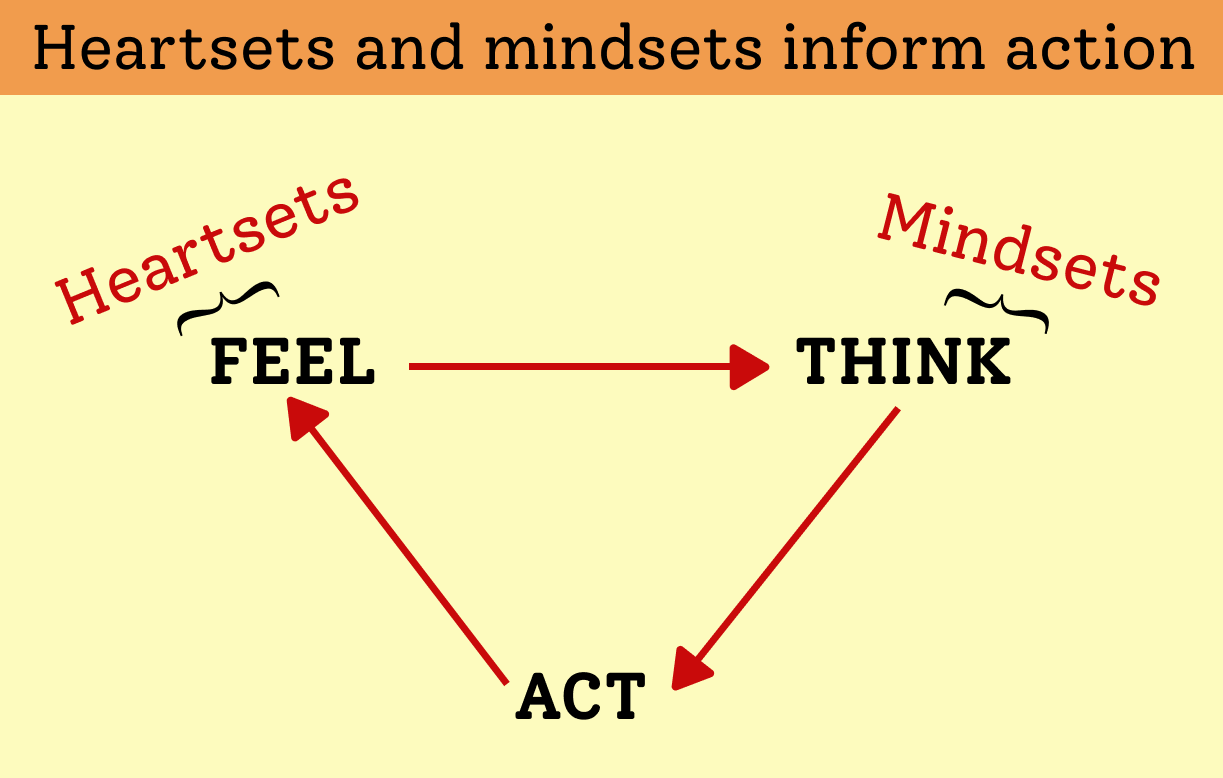Heartsets (like mindsets, but emotional states) and mindsets are vitally important to our daily functioning because humans experience an internal loop of feeling and thinking before we take action. Heartsets inform our perspective when we’re feeling, while mindsets influence our perspective when we’re thinking.

I shared some points about this feel - think - act loop of human consciousness in a prior post, Stories we tell ourselves, including insights from Donna Lichaw based on her book “The Leader’s Journey”:
There’s an extremely tight loop in our consciousness between our positive/negative/or/neutral “feeling” response and our “thinking” response. I asked Donna about which truly comes first, and she reported that the scientific literature still debates which comes first, although it’s leaning towards first we think and then we feel.
Whether our minds think then feel or feel then think, the most important thing we can learn to do is unpack what’s happening in that loop before we take action.
Because if we don’t find a way to examine what we’re thinking and feeling, the actions we take toward a reward are extremely likely to be nothing more than a mindless habit loop, an old program we’re running without any debugging or optimizing.
Fostering gratitude
The book I’m writing introduces various positive heartsets we can practice and develop to improve our time at work, and really, everything we undertake. A preeminent heartset to foster is gratitude. Gratitude is a feeling of appreciation for what is happening in this present moment; what we have right now in our life; and what we are, given all that has passed.
Study after study1 has validated the power of gratitude to pull us away from suffering and toward happiness. People who count their blessings tend to be healthier (yes, physically!) and less depressed.
Have you ever felt gratitude, and sensed into it? To me, it’s a particularly elevated emotion, and I mean that literally: when grateful, my spirit seems to be lifted upwards, reaching toward cosmic consciousness.
Gratitude is particularly potent because it directly counteracts negative emotions — it’s an antidote for suffering. And of course, it’s the difficult times that test us the most. The spirit of thankfulness can imbue all of your feelings and actions with increased grace.
A couple decades ago, I had a difficult experience when I joined a large organization as one of their very first researcher-and-designer types of professional. Previously, I’d only worked as a consultant, where my way was paved with clients by a certain measure of authority granted to me. Suddenly, I had to establish credibility and move product design forward without that mandate. My manager saw me struggling and called me in for a heart-to-heart. I was gutted and embarrassed that I wasn’t operating with aplomb and easily moving development forward. Instead of getting defensive or discouraged, though, I was thankful for his awareness and grateful for his honesty. I became determined to develop skills in persuasion and influence. That challenging situation helped set me on the path of recognizing the power and importance of socialization and alignment for teams seeking to build great solutions — one I continue to tread and expound on! Other examples of thankfulness abound in my work and life, as gratitude can transform even tragic events.
No positive emotion is a panacea, though, and gratitude is no exception — it takes time for gratitude as a heartset and an active practice to have a lasting effect on the mind, body, and spirit.
Glimmers 💖
So there’s no time to waste: let’s tap into gratitude now!
In my “Helpful Heartsets” talk the other week where I spoke about gratitude, I shared a little exercise for feeling more gratitude in our daily lives and building a gratitude habit.
Gratitude does not need to be (and really, should not be) reserved for major epiphanies and huge moments of relief. Gratitude may be felt almost anywhere.
You’ve doubtless heard of “triggers,” things that set off a negative response in us. Please let me introduce you to its opposite: glimmers. Glimmers are anything that might generate a grateful feeling, a sense of thankfulness and appreciation.
Take every moment you can to note a glimmer. Did you catch the door before it closed allowing you to more easily walk through it? Did you see a beautiful flower in somebody’s yard? Did you hear a great song on the radio? Did the meeting end five minutes early??
Revel in even the smallest wins and delights, being grateful when you notice them. Life is short, my friends, and working can be ever-so-difficult. Gratitude significantly lightens the load.
Here’s a clip around gratitude from my “Helpful Hearsets” talk (glimmers included):
May all who celebrate have a wonderful Thanksgiving holiday this week! 🦃 🥧 To honor this season, I’d like to close with a blessing from the Native American Ojibwe tribe:
“May you be strengthened by yesterday’s rain, walk straight in tomorrow’s wind, and cherish each moment of the sun today.” - Ojibwe saying
Lizz at Devise is a publication exploring the space of design and product management through the lens of heart-centered values and teamwork. So grateful for your time and attention! Lizz operates Devise Consulting, and is writing a book about heartsets, mindsets, and working on teams to build great solutions.
See a couple of good overviews here from Harvard Health Publishing or here from The Greater Good Magazine.



